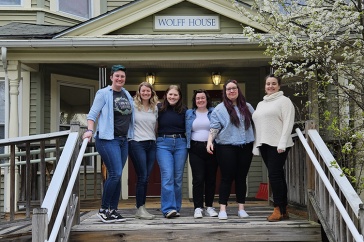
The world can seem overwhelming at times, especially for those of us who encounter issues around sexual assault, stalking, etc. SHARPP revolves around difficult things. Many people don’t want to engage because it makes them uncomfortable, nervous or angry. It is something I have struggled with discussing and learning about. Yet sexual violence is a problem that isn’t going away. So, we must learn how to deal with it at many levels, from the individual to the organized.

My first semester at UNH, I became a SHARPP community educator (CE). This enabled me to be a part of the UNH community, build my understanding of different issues and help prevent them. Being a CE meant that I was engaging with those issues that upset me, but I was doing so in a way that was productive and supportive of survivors. I was handling my discomfort instead of ignoring it. Each semester, new CEs are trained to help educate the UNH community on issues people face.

For a more direct approach to supporting survivors, UNH students can train to become peer advocates. This involves taking a semester-long course, after which the new advocates begin their work in some of SHARPP’s most important services. Peer advocates run the SHARPP helpline, as well as the Ask an Advocate program on the SHARPP website. They accompany survivors to hearings and guide people through the different options available to them. Peer advocates provide crisis intervention and are available when anyone looking for help walks into the SHARPP office during the day.
These are ways that many members of the UNH community commit time to ending violence. Yet, they are not required for everyone, nor are they the only actions that need to happen. There are never going to be enough community educators or advocates to intervene in every situation of sexual or relationship violence in our community. Preventing violence means that individuals have to be active bystanders. The first step is education. Do you know the signs of a dangerous situation? Do you know how to safely intervene? Do you know who to call in case of an emergency. The people not directly involved in a situation might be the ones most equipped to prevent it. When going out with friends, have a plan about what everyone is expecting. If your friend explicitly says to you that he is not planning on becoming drunk, and then he does, that might be a sign something else is going on. To ensure you and your friends are safe, go and leave events as a group. Be aware of everyone’s situation and have clear expectations about things. Trust your instincts. If something is making you uncomfortable, make sure to address that by leaving or helping your friend.
Another central aspect is the abolishment of rape culture. Even if someone is not immediately in danger, problems relating to sexual and relationship violence show up. If someone makes a joke about rape, they are contributing to the harm that survivors experience. Addressing violence means that you should challenge those moments. When people shame survivors of domestic violence and ask why they never just left, take the opportunity to educate those people. Holding your friends responsible is important because it shows that engaging in rape culture is not acceptable. Knowing about issues will make you much more effective in doing so.
Starting on a path of ending violence can be confusing. Luckily, SHARPP is there to help.

April is Sexual Assault Awareness Month, a national event where organizations educate the public about sexual assault. SHARPP has a plethora of events:
- Find us in the MUB Union Court every Tuesday and Thursday during Common Exam Time.
- April 8-12 is International Anti Street-Harassment Week, and we have an exhibit at the library on the second floor.
- On Wednesday, April 10, SHARPP is hosting a free workshop for student activists around Title IX, the central legislation that gives students the right to not be sexually harassed while attending publicly funded institutions. Sage Carson, the manager of Know Your IX, will be leading the workshop to strengthen community organizing and activism skills.
- April 24 is Denim Day. Based on a ruling by the Italian Supreme Court that a survivor couldn’t have been raped because her jeans would have been too tight for her rapist to remove without her permission, wearing jeans is a sign of protest on Denim Day.
- On Thursday, April 25, SHARPP and women’s studies will host a discussion about consent within the LGBTQ+ community, which experiences some of the highest rates of sexual violence in the nation.
- On Sunday, April 28, SHARPP will be setting up a visual display of t-shirts made to support survivors as part of the ongoing Clothesline Project.
Our main event for April is happening during Common Exam Time on Thursday, April 11. This is the UNH Stepping Out Against Violence Rally & Walk. This is an event aimed at building awareness and sending a strong message that the UNH community is against all forms of violence, including sexual violence and relationship abuse. There will be short speeches with guest speakers, info tables, a call to action and a walk around campus.
We hope to see you at our events this month.
-
Written By:
Colleen Spear '21 | SHARPP

















































